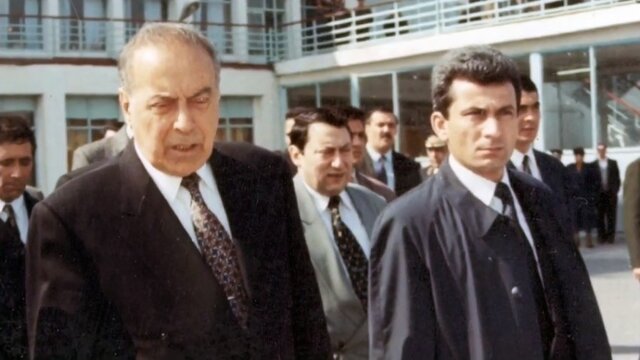Pictured: Heydar Aliyev and Surat Guseynov
Surat Guseynov was a significant figure in the post-Soviet space, particularly in Azerbaijan, in the 1990s. He was a colonel and commander in the Azerbaijani army. In 1993, he led a successful military coup that brought loyal troops from Ganja to Baku and led to a change of power in the country.
After the coup, instead of seizing power himself, Surat Guseynov, a popular military commander but an inexperienced politician, invited Heydar Aliyev, then head of the Nakhchivan Autonomous Republic, to come to Baku. Heydar Aliyev was elected Chairman of the Milli Majlis (Parliament) of Azerbaijan and temporarily assumed leadership of the country. Guseynov was appointed prime minister.
Over time, however, Heydar Aliyev accused Surat Guseynov of creating unrest in the country and subsequently removed him from office and subjected him to repression. Guseynov tried to hide in Russia, but was extradited to Azerbaijan in 1997 and sentenced to life imprisonment. He was later pardoned by Ilham Aliyev in 2004 and spent the rest of his life as a political pensioner, dying in Istanbul where he was receiving medical treatment.
Surat Guseynov’s role was crucial during the Azerbaijani-Armenian conflict over Nagorno-Karabakh, especially when the Azerbaijani army suffered setbacks. President Elchibey blamed Guseynov for the military failures and tried to remove him from command, which led to a military rebellion. As a result, Elchibey was removed from power and Azerbaijan suffered significant losses during the conflict.
Although Azerbaijan has moved on from Guseynov’s influence, some people continue to compare his coup to more recent events, such as the attempted coup by Prihodko’s group. Guseynov’s experience could be relevant in today’s circumstances, especially in regions with ongoing conflicts and geopolitical challenges.
In conclusion, Surat Guseynov played a significant role in the history of the post-Soviet space, particularly in Azerbaijan. While his actions shaped the country’s history, his influence eventually waned and Azerbaijan moved on from that period. However, his legacy and experience may be relevant in other geopolitical contexts.

